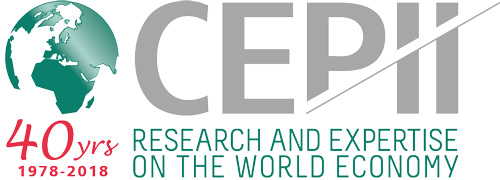|
Ten years after the crisis, the international economic relationships are being deeply transformed in many areas such as the economic and financial stability, international competitiveness, migration flows and the climate change challenge. What are major challenges that France and Europe are facing in today’s context? To address this question, the CEPII organizes, on the occasion of its 40th anniversary, three panel discussions, each bringing together three experts, foreign and French, decision-makers and academics.

|
|
 |
|
14h00 - 14h15 |
Introductory remarks : Sébastien Jean, Director, CEPII
|
|
14h15 - 15h30 |
Claudia Buch, Vice-President, Deutsche Bundesbank 
Benoît Cœuré, Member of the Executive Board, European Central Bank  
Francesco Giavazzi, Professor, Bocconi University
Moderator: Sébastien Jean, Director, CEPII |
Have the main advanced economies become more resilient to real and financial shocks?
For the past ten years, the world has been experiencing shocks and transformations of varied nature, such as financial, trade-related, technological, political and geopolitical challenges. Yet, the crisis seems to be finally overcome in advanced countries. Does it mean that, thanks to structural changes and more efficient economic policies, they are better adapting to a changing environment and have become more resilient to shocks? Or, rather, are we witnessing the rise of new imbalances paving the way for another crisis?
|
|
15h30 - 16h45 |
Alicia Adsera, tenured Research Scholar at the Woodrow Wilson School, Princeton University
François Bourguignon, Chaire émérite, Paris School of Economics
Pascal Lamy, Président d’honneur, Institut Jacques Delors
Moderator: Marie de Vergès, journalist, Le Monde |
How could Europe adapt to changing globalization?
Globalization has changed dramatically since the financial crisis, not only in the nature and the pace of growth of international economic interactions through trade, capital or people, but also in the distribution of wealth, the structure of the institutions and the mechanism from which balances or unbalances can result. How could Europe adapt to this new context? Can multilateralism remain the pillar of its external economic relations? Should we redefine the European approach to migration issues? Should Europe’s relations with emerging and developing countries be rethought? How should the existential challenge of climate change be addressed?
|
|
|
|
16h45 - 17h15 |
Coffee break |
|
|
|
|
|
17h15 - 18h30 |
Ramon Fernandez, Directeur général délégué, Directeur financier et stratégie du Groupe Orange
Kalypso Nicolaidis, Professor of International Relations and director of the Center for International Studies, Oxford University 
Thomas Wieser, former President, Euro-Working Group, European Council
Moderator: Marie Charrel, journalist, Le Monde |
|
|
How to complete the euro?
The Eurozone crisis has forced the march towards a deeper integration prompting for a new fiscal treaty, the banking union, the European Stability Mechanism, the Juncker Plan, a project of a capital markets union. While these reforms constitute undeniable progress in completing the institutional underpinnings of the single currency, major challenges remain, such as resolving persistent current account imbalances, redressing weak long-term growth or preventing localized banking weaknesses from pushing back risk-sharing projects. These challenges are made even more complex by the fact that the euro area does not fully cover the European Union. Has the risk of a Eurozone break-up been superseded? What are the priorities? What level of integration should be targeted? What should be the political governance of the Euro area within the European Union?
|
|
18h30 - 18h40 |
Closing remarks : Jean Lemierre, Chair of the Board of Directors of BNP Paribas, chair of CEPII’s board |
|
|
|
In the press:
|








